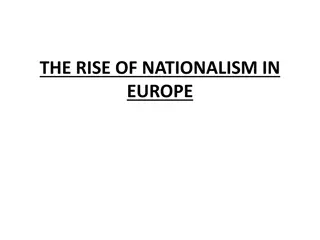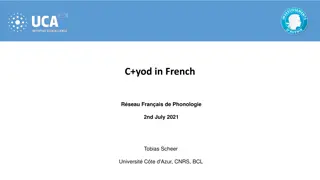French Culture Through History: From High Culture to National Identity
France, and particularly Paris, has been a significant center of high culture since the 17th century, influencing art, cinema, fashion, literature, and more globally. The French take immense pride in their nation, valuing equality as a core principle. French culture encompasses oral traditions, renowned literature, and the impact of historical events like the country's defeat in World War II.
Download Presentation

Please find below an Image/Link to download the presentation.
The content on the website is provided AS IS for your information and personal use only. It may not be sold, licensed, or shared on other websites without obtaining consent from the author. Download presentation by click this link. If you encounter any issues during the download, it is possible that the publisher has removed the file from their server.
E N D
Presentation Transcript
FRENCH CULTURE 1 . FRANCE, AND IN PARTICULAR PARIS, HAS PLAYED AN IMPORTANT ROLE AS A CENTER OF HIGH CULTURE SINCE THE 17TH CENTURY, FIRST IN EUROPE, AND FROM THE 19TH CENTURY ON, WORLDWIDE. FROM THE LATE 19TH CENTURY, FRANCE HAS ALSO PLAYED AN IMPORTANT ROLE IN CINEMA, FASHION, LITERATURE, TECHNOLOGY, SOCIAL SCIENCE AND MATHEMATICS. . THE FRENCH TAKE IMMENSE GREAT PRIDE IN THEIR NATION AND GOVERNMENT AND ARE TYPICALLY OFFENDED BY ANY NEGATIVE COMMENTS ABOUT THEIR COUNTRY. VISITORS, PARTICULARLY AMERICANS, OFTEN INTERPRET THEIR ATTITUDE TOWARD FOREIGNERS AS RUDE. "FROM AROUND THE 16TH CENTURY, IN EUROPE, CULTURE BECAME A TERM FOR THE CULTIVATION OF THE MIND, THE INTELLECT, KNOWLEDGE, LEARNING, CREATIVE FACULTIES AND ACCEPTABLE WAYS OF BEHAVING. THE FRENCH BELIEVE IN EQUALITY, AND IS PART OF THE COUNTRY'S MOTTO: "LIBERT , EGALIT , FRATERNIT ." MANY SAY THEY PLACE A HIGHER IMPORTANCE ON EQUALITY THAN LIBERTY AND FRATERNITY, THE OTHER TWO WORDS IN THE MOTTO.
FRENCH CULTURE 2 Oral traditions and folktales predominated in pre-modern France. Up until the mid-twentieth century, rural communities held veill es, in which neighbors gathered in someone's home around the hearth to trade stories and tales. French written literature is considered one of the greatest world traditions. The first works of literature in French were the Chansons de Geste of the eleventh century, a series of epic poems. During the Renaissance, France's great national literature flourished with works by Fran ois Rabelais, Michel Eyquem de Montaigne, and Pierre de Ronsard. Enlightenment writers such as Voltaire, Montesquieu (Charles-Louis de Secondat), and Jean-Jacques Rousseau helped to shape a national consciousness during this time. Nineteenth- century writers took up themes of struggles between social classes, clerical and anticlerical forces, and conservatives and liberals. They also developed a form of realist writing that charted the various regional differences, and urban-rural splits, in France. Fran ois-Auguste-Ren de Chateaubriand, Madame de Sta l, George Sand, Victor Hugo, Stendhal (Marie-Henri Beyle), Honor de Balzac, and Gustave Flaubert were the great novelists of this period. Poets included Charles-Pierre Baudelaire, Alphonse-Marie-Louis de Prat Lamartine, Arthur Rimbaud, Paul Verlaine, and St phane Mallarm . Earlier twentieth century writers include Marcel Proust, Anatole France, Jules Romains, Sidonie-Gabrielle Colette, Fran ois Mauriac, Louis-Ferdinand Celine, and Andr -Georges Malraux. French existentialism during the postwar period is associated with writers Albert Camus and Simone de Beauvoir. The so-called "new novel" came to the fore in the 1950s and its representatives include Nathalie Sarraute and Alain Robbe-Grillet.
FRENCH CULTURE 3 France s defeat by German troops in 1940 and the resultant division of the country were experienced as a national humiliation, and all French citizens were confronted with an unavoidable choice. Some writers escaped the country to spend the remaining years of the war in the safety of exile or with the Free French Forces. Others, faithful to political options made during the previous decade, moved directly into collaboration. Still others, out of pacifist convictions or a belief that art could remain aloof from politics, tried to carry on as individuals and as writers. . Several writers joined the military, as well as the intellectual, resistance. Andr Malraux served on many fronts and commanded a group of underground Resistance fighters in World War II in France, projecting the image of the writer as a man of action; he was to serve as a minister under Charles de Gaulle in the postwar government and the Fifth Republic. .
FRENCH CULTURE 4 The German attack on the Soviet Union in 1941 was decisive for the French Communist Party, which was to gain considerably through its organized opposition to fascism. The events of the 1930s and 40s strengthened the conviction that intellectuals could not remain politically uncommitted. After 1945, existentialism, depicting humanity alone in a godless universe, provided intellectual classes for this view of individuals as free to determine themselves through such choices. the Occupation brought prestige and an attentive audience to writers who upheld the honor of their defeated country. The poetry of resistance reached a wide public, notably in the works of the Communist activists Paul luard and Louis Aragon
FRENCH CULTURE 5 Sartre The war transformed the literary scene, eclipsing (exceeding) some writers and lending prestige for the time being, at least to those who had made the right moral and political choices. During the Occupation, Jean-Paul Sartre had continued to explore the questions of freedom and necessity, and the interrelationship of individual and collective responsibility and action, in plays such as Les Mouches (1943; The Flies) and Huis-Clos (1944; No Exit, also published as In Camera) and in the treatise L tre et le n ant (1943; Being and Nothingness). After Liberation, the writer and his ideas set the tone for a postwar generation that congregated (gathered) in the caf s and cellar clubs of Saint-Germain-des-Pr s. The myth of this disillusioned youth, its district of Paris, its innocence, its jazz clubs, and its worship of Sartre were captured in Boris Vian s L cume des jours (1947; Froth on the Daydream). Sartre s patronage of Jean Genet, Cocteau s discovery, helped confirm the reputation of Genet, whose novels of prison fantasy and homosexual desire added to the radical ferment of the 1940s (among them Notre- Dame-des Fleurs [1943; Our Lady of the Flowers] and Querelle de Brest [1947; Querelle of Brest]) and whose plays would give new direction to drama in the 1950s.
FRENCH CULTURE 6 Camus At this period, Sartre s name was linked with that of Albert Camus, then editor in chief of Combat, whose novel L tranger (1942; The Stranger, also published as The Outsider) explored similar issues of the social attribution of identity. The two broke off relations after Sartre s critique of Camus s L Homme r volt (1951; The Rebel). Sartre moved toward the existentialist Marxism of his Critique de la raison dialectique (1960; Critique of Dialectical Reason) and Camus toward a stoical humanism, his later fiction (La Chute, 1956; The Fall) showing evidence of his isolation, his creative unease, and his distress over France s war with Algeria.
FRENCH CULTURE 7 Beauvoir The conflicts submerged in the euphoria (the feeling of happiness ) of liberation surfaced during the Cold War and were intensified by the colonial wars of the 1950s. In her novel Les Mandarins (1954; The Mandarins), Simone de Beauvoir (Sartre s lifelong partner) vividly depicted the moral, political, and personal choices confronting French intellectuals in a world defined by the battle for hegemony (control) between Washington and Moscow. However, her analysis of women s situation, Le Deuxi me Sexe (1949; The Second Sex), a succ s de scandale on its first appearance, was to be a more influential achievement. The publication in 1958 of her M moires d une jeune fille rang e (Memoirs of a Dutiful Daughter) marked the beginning of a sequence of autobiographical works that tracked the different phases of her own life and the exchanges within it between public and private experience.
STRUCTURALISM 8 Learning to live with uncertainty and to take pleasure in the abandonment of absolutes was the determining mode of thought in the 1960s and 70s, and in this French thinkers set the international agenda. Structuralism, based on the analytic methods of the linguistic theorist Ferdinand de Saussure, proposed that phenomena be considered not in themselves but in terms of their working relationship to the organized structures within which they exist. The structural anthropology of Claude L vi-Strauss resulted in popular texts on social and cultural practices that forced Western cultures to reconsider themselves in the light of the other cultures they had exploited in order to flourish.
STRUCTURALISM 9 Lacan and Foucault The teaching and writing, much of it dating to the 1930s, of the psychoanalyst Jacques Lacan ( crits [1966; Ecrits: A Selection]) influenced many major thinkers in the 1960s and 70s. Lacan proved to be a major influence on avant-garde French feminism, and he led Freudian thought in fresh directions through his work on the part played by language and unconscious desire in the formation of a human subject that must always be seen as open, incomplete, and in process. Michel Foucault has perhaps been even more influential than Lacan, his studies carrying into the context of public and private life his explorations of the relations of power to forms of knowing. In the early 1960s, writing in an accessible fashion on gripping topics such as madness, Foucault showed how the individual subject is formed inside the discourses of society s institutions.
ALAIN-FOURNIER In Le Grand Meaulnes. Alain-Fournier's only completed novel (published in 1913), the main characters find happiness effortlessly only to quickly and irrevocably lose it. The characters' quests for happiness remain elusive because happiness is transitory and therefore impossible to maintain. The novel is ultimately about lost innocence the realization that life is a series of compromises and the inability to recapture the past. Fournier himself suffered from the same dilemma as that of his characters. In many respects, Fournier may be viewed as attempting through imaginative writing to reconcile the real world with his ideal of what reality should be. Life for Fournier is comprised of two distinct but opposing worlds that nevertheless coexist simultaneously. At the turn of the century, artists combined the real world of Naturalism and the passionate, mysterious world of Symbolism into what became Impressionism. Fournier uses nostalgia, adolescence, and symbolism in structuring the theme that happiness is elusive and fickle. It is never accessible when it is most desperately needed.
ALAIN-FOURNIER In Le Grand Meaulnes. Fournier united his sense of everyday reality with a dream-world, fantastic and otherworldly. In this manner he strove to see beyond the mundane existence he found stale and discover another more wonderful place, that other mysterious landscape.' Most importantly, in his life and through the writing of a novel, Fournier strove to realize an ideal of Love that would satisfy his physical and metaphysical quests for happiness. Ultimately, the quest and its unrealized fulfillment become the substance that, from his own temperament and life experience, enabled Fournier to produce a classic work of literature.
ALAIN-FOURNIERS LES GRAND MEAULNES THEMES Childhood: innocent pleasures were defined by childish whimsy Losing happiness: inability to experience happiness . sought happiness in a resurrection of the past, that seemed most doomed to misery in present times. Pleasure of youth: the disillusionment that oft-characterizes maturity the responsibilities of career-path, tranquility: the certainty that he had tranquility: the certainty of reached one s goal.























